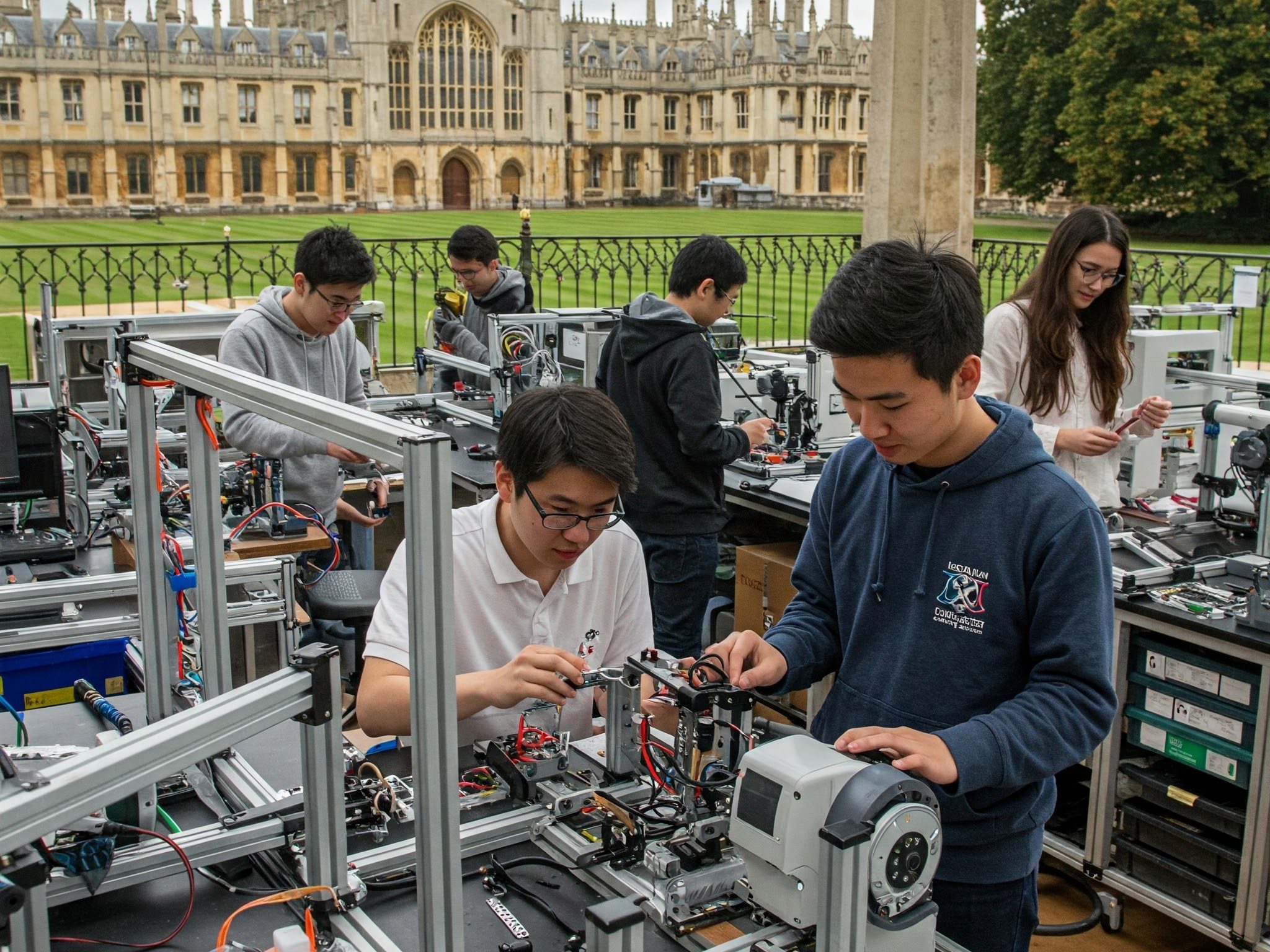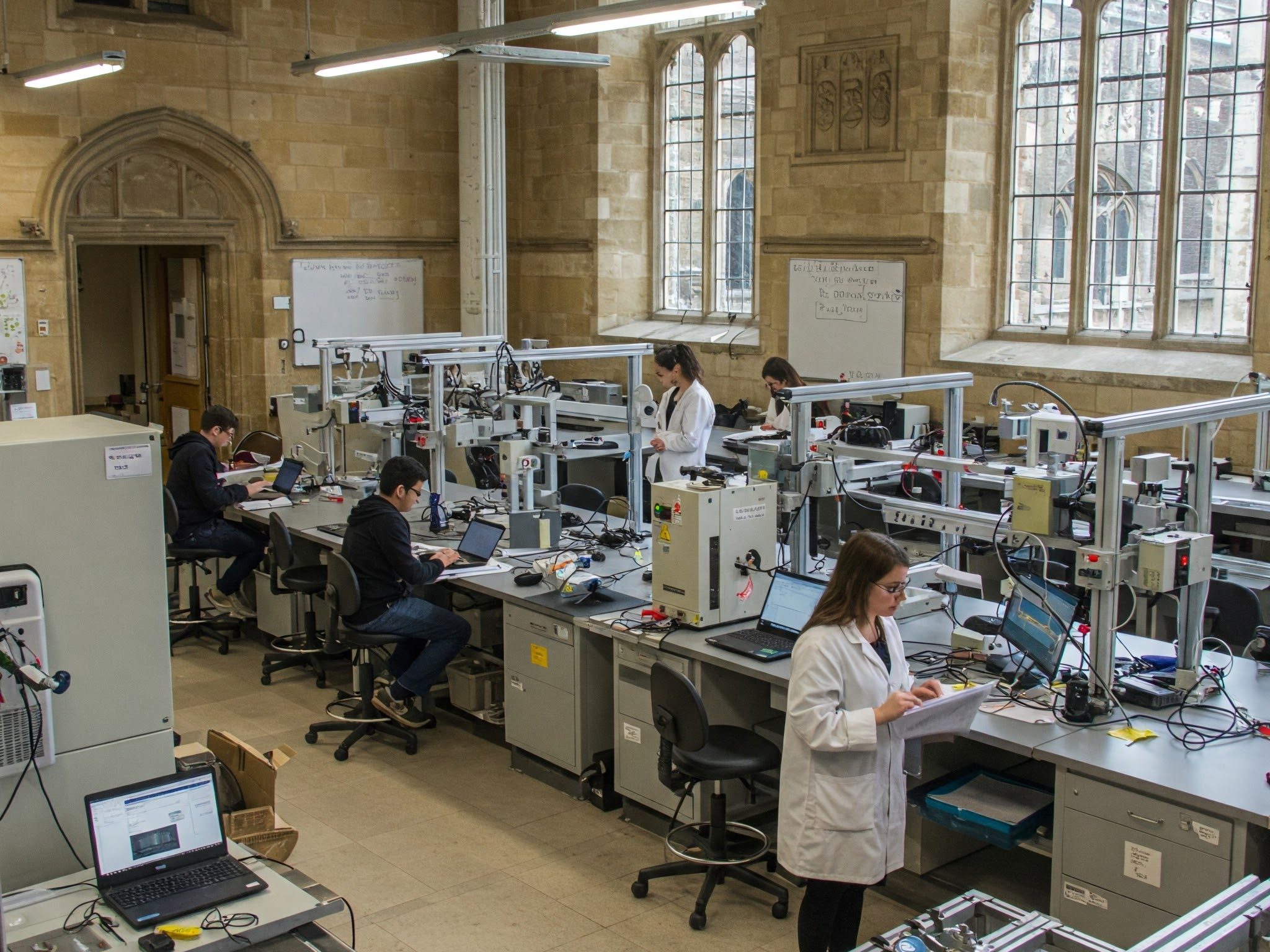
Are you dreaming of pursuing an engineering degree at Cambridge University, renowned for having one of the most esteemed engineering programmes globally?
According to The Complete University Guide 2025, Cambridge’s Engineering programme, which offers various engineering degrees, is ranked as the top choice in the UK. It provides a distinct educational journey that equips students with the knowledge and skills necessary for outstanding careers across diverse engineering sectors. With numerous engineering degrees available at Cambridge, students have the opportunity to tailor their academic journey to suit their passions and career aspirations.
The program is structured to foster innovation, critical thinking, and practical problem-solving, with a curriculum that combines theoretical foundations with hands-on experiences. Boasting state-of-the-art facilities and access to leading research, students will engage with pioneering projects and collaborate with experts in their fields.
Moreover, engineering degrees at Cambridge are designed to equip students with both theoretical knowledge and practical skills, addressing real-world challenges faced in the engineering industry today.
As applications will soon open for courses beginning in October 2026, now is the ideal time to delve into the remarkable offerings of this prestigious engineering degree and strategise your successful application. Understanding the prerequisites and crafting a compelling personal statement can position you as a strong candidate in this competitive admissions process.
Key Takeaways
- Cambridge offers both a 3-year BA (Hons) and a 4-year MEng engineering degree program, starting in October 2026
- Applications for 2026 entry open in September 2025, with a submission deadline of 15 October 2025
- All applicants must take the Engineering Admissions Assessment (ENGAA) and attend an interview if shortlisted
- International students need strong foundations in Mathematics and Physics, with AAA at A-Level or equivalent
- Students study a broad curriculum for the first two years before specializing in one of nine engineering disciplines
- 6 weeks of industrial experience is required by the end of the third year
- Numerous scholarships are available specifically for international engineering students
- Cambridge Engineering graduates enjoy excellent career prospects with leading global companies
- The course is fully accredited by all major engineering institutions
Why Choose Engineering Degrees at Cambridge in the UK
Cambridge University’s Engineering Department stands as a beacon of excellence in engineering education, consistently ranking as the highest achieving amongst UK universities. The department’s approach to teaching engineering degrees at Cambridge is both comprehensive and flexible, providing students with strong foundations across multiple engineering disciplines before allowing specialisation. By focusing on engineering degrees at Cambridge, students can expect to receive a world-class education that prepares them for a multitude of career paths.
The Engineering tripos (Cambridge’s term for degree courses) offers both a 3-year BA (Honours) program and a 4-year integrated Master’s degree (MEng). This structure gives students the flexibility to choose between a shorter degree or continuing for an additional year to gain master’s-level qualifications, enhancing their career prospects in the increasingly competitive engineering job market.
Cambridge Engineering: A Tradition of Excellence
What makes studying engineering degrees at Cambridge University truly special is its combination of:
- Broad-based learning across all major engineering disciplines in the first two years
- Specialisation opportunities from the third year onwards
- World-class research facilities and faculty
- Strong industrial connections and placement opportunities
- Internationally recognised accreditation from all major engineering institutions
Course Structure: Engineering Degrees at Cambridge Explained
The engineering program at Cambridge, offering various engineering degrees at Cambridge, is designed to build your knowledge progressively while keeping your options open for specialisation.
The engineering program at Cambridge is designed to build your knowledge progressively while keeping your options open for specialisation.
First and Second Years: Building Strong Foundations
During the first two years, all students follow the same curriculum, gaining exposure to:
Furthermore, students enrolled in engineering degrees at Cambridge benefit from a vibrant community of scholars and a rich tradition of innovation.
- Mechanical and structural engineering
- Materials science
- Electrical and information engineering
- Civil, structural, and environmental engineering
- Mathematics and computing for engineers
- Business economics
This broad approach ensures you understand how different engineering disciplines connect and interact, giving you a significant advantage over graduates from more narrowly focused courses.
Key Skills Developed in Engineering Degrees at Cambridge
From the third year onwards, students can specialise in one of these exciting areas:
Engineering degrees at Cambridge provide a solid foundation for a successful future in various engineering sectors.
- Aerospace and Aerothermal Engineering
- Bioengineering
- Civil, Structural and Environmental Engineering
- Electrical and Electronic Engineering
- Electrical and Information Sciences
- Energy, Sustainability and the Environment
- Information and Computer Engineering
- Instrumentation and Control
- Mechanical Engineering
The fourth year (MEng) offers advanced modules in your chosen specialisation, alongside a substantial research project that allows you to work alongside Cambridge’s renowned research teams on cutting-edge problems.
Why Choose Engineering Degrees at Cambridge?
For students seeking global experience, Cambridge offers exchange opportunities with:
The course structure for engineering degrees at Cambridge is meticulously designed to provide a comprehensive understanding of core engineering concepts while also allowing for flexibility in specialisation.
- Ecole Centrale Paris
- National University of Singapore
These exchanges, available to a limited number of students in their third year, provide invaluable international exposure that many employers value highly.
World-Class Facilities for Engineering Degrees
When studying engineering degrees at Cambridge, you’ll have access to exceptional facilities that support both theoretical learning and practical skills development:
The Dyson Centre for Engineering Design
Named after its benefactor Sir James Dyson, this state-of-the-art facility is equipped with:
- Traditional hand and machine tools
- Modern computer-controlled machinery
- Rapid prototyping equipment
- Collaborative workspaces for team projects
Additionally, the recognition of engineering degrees at Cambridge ensures that graduates are highly sought after in the global job market.
Design and Project Office
With more than 80 workstations, this facility supports the computational aspects of engineering design work.
Specialised Engineering Library
Housing over 30,000 books and approximately 350 journals, the Engineering Department’s dedicated library provides essential resources for your studies.
Cambridge University Library
As a Cambridge student, you’ll also have access to one of the world’s oldest and most impressive university libraries, containing over 8 million items.
Industrial Experience: Bridging Theory and Practice
A key component of engineering degrees at Cambridge is practical industry exposure. By the end of the third year, students must complete a minimum of 6 weeks of industrial experience, which can be achieved by:
- Deferring entry to complete a placement before starting the course
- Undertaking placements during vacation periods
- Participating in industry-sponsored projects
The department’s Industrial Placement Co-ordinator can help you find suitable placements both in the UK and abroad, as well as support with finding sponsorship opportunities.
Professional Accreditation for Engineering Degrees
Cambridge’s engineering courses are fully accredited by the Engineering Council and all major engineering institutions, including:
- Institution of Mechanical Engineers (IMechE)
- Institution of Engineering and Technology (IET)
- Institution of Civil Engineers (ICE)
- Institution of Structural Engineers (IStructE)
- Institute of Measurement and Control (InstMC)
- Institute of Highway Engineers (IHE)
- Chartered Institution of Highways and Transportation (CIHT)
- Institute of Physics and Engineering in Medicine (IPEM)
- Royal Aeronautical Society (RAeS)
The specific accreditation you receive will depend on the modules you choose during your course, particularly in the specialisation years.
Application Timeline for 2026 Entry
Graduates of engineering degrees at Cambridge go on to excel in various sectors, including aerospace, energy, and technology, showcasing the versatility of their education.
For students aiming to join the October 2026 intake, here’s the critical application timeline:
July-August 2025
- Research colleges and decide which to apply to
- Begin preparation for ENGAA (Engineering Admissions Assessment)
September 2025
- UCAS applications open
- Start drafting personal statement
- Register for the ENGAA
15 October 2025
- UCAS application deadline for Cambridge Engineering
- Final date for ENGAA registration
Late October/Early November 2025
Choosing engineering degrees at Cambridge opens doors to a multitude of opportunities, allowing students to engage with cutting-edge research and industry leaders.
- ENGAA assessment takes place
December 2025
- Shortlisted candidates attend interviews (may be in-person or online)
January 2026
- Decision letters sent to applicants
August 2026
- A-Level results (or equivalent) published
- Confirmation of places for those meeting offer conditions
October 2026
- Course begins
Entry Requirements for Engineering Degrees at Cambridge

Cambridge has specific requirements for engineering applicants:
Academic Requirements
- A-Levels: AAA, with Mathematics and Physics required
- IB: 40-42 points, with 7,7,6 in Higher Level subjects (including Mathematics and Physics)
- Other international qualifications are accepted (see specific requirements on the Cambridge website)
ENGAA (Engineering Admissions Assessment)
All applicants must take the Engineering Admissions Assessment, which tests:
- Mathematical knowledge and skills
- Physics knowledge and applications
- Problem-solving abilities
Interview Process
Shortlisted candidates will be invited to interview, which typically involves:
- Discussion of mathematical and scientific problems
- Exploration of your motivation for studying engineering
- Assessment of your analytical thinking and problem-solving approach
Tips for International Applicants to Engineering Degrees
International students make up a significant proportion of Cambridge’s engineering cohort. Here’s how to prepare a successful application:
1. Start Early with Academic Preparation
- Ensure strong foundations in Mathematics and Physics
- Take additional advanced courses where available in your education system
- Consider taking extension qualifications like STEP Mathematics
2. Develop English Language Proficiency
- Aim for IELTS scores of 7.5 overall (with no element below 7.0)
- Practice technical and academic writing in English
- Read engineering publications and journals in English
3. Build a Strong Personal Statement
- Demonstrate genuine passion for engineering through specific examples
- Highlight relevant projects, competitions, or work experience
- Show understanding of multiple engineering disciplines
- Connect your previous experiences to your chosen field of engineering
4. Prepare Thoroughly for the ENGAA
- Use past papers available on the Cambridge Assessment Admissions Testing website
- Practice time management for the test
- Review A-Level (or equivalent) Mathematics and Physics content
- Work through problem-solving exercises regularly
5. Research Your College Choice
Cambridge operates a collegiate system, and engineering students belong to both the Engineering Department and a college. Research different colleges to find one that:
- Has strong tradition in engineering
- Offers facilities that match your interests
- Provides financial support that might be relevant to your situation
- Creates an environment where you’ll thrive socially and academically
6. Gain Practical Engineering Experience
- Seek internships or work experience in engineering firms
- Participate in engineering competitions or challenges
- Develop personal projects that demonstrate practical skills
- Join engineering clubs or societies at your current school
Scholarships and Financial Aid for Engineering Degrees
Studying at Cambridge represents a significant investment, but numerous funding opportunities exist, particularly for international students:
Cambridge Commonwealth, European & International Trust
This trust offers several scholarships specifically for international students, including:
- Cambridge International Scholarships: Covers full fees and maintenance for PhD students
- Cambridge Master’s Scholarships: For students pursuing one-year Master’s courses
- Cambridge Trust Scholarship: Various partial and full scholarships for undergraduate and graduate students
College-Specific Scholarships
Many Cambridge colleges offer their own scholarships for international students. Examples include:
- Trinity College Scholarships: Known for strong support of engineering students
- Churchill College Winston Churchill Scholarship: Specifically for engineering and science students
- Corpus Christi College International Scholarships: Available to outstanding applicants from outside the UK
Country-Specific Scholarships
Depending on your country of origin, you may be eligible for specific funding:
- Gates Cambridge Scholarships: For students outside the UK
- Chevening Scholarships: UK government’s global scholarship programme
- Commonwealth Scholarships: For students from Commonwealth countries
Engineering-Specific Scholarships
Several scholarships target engineering students specifically:
- The James Dyson Foundation Scholarships: Support for undergraduate engineers
- Royal Academy of Engineering Scholarships: Various programmes supporting engineering education
- Institution of Engineering and Technology Scholarships: Professional body scholarships for promising engineers
How to Apply for Scholarships
Most scholarships require separate applications from your university application. To maximise your chances:
- Research eligibility criteria thoroughly
- Start applications early (some deadlines are before university admission offers)
- Prepare strong personal statements specific to each scholarship
- Secure excellent academic references
- Highlight leadership potential and community involvement
Cost of Studying Engineering at Cambridge
Understanding the full costs involved will help you plan financially:
Tuition Fees
For international students starting in 2026 (estimated):
- £38,000-£45,000 per year for engineering courses
College Fees
International students typically pay college fees of:
- £10,000-£12,000 per year
Living Expenses
Cambridge estimates living costs (accommodation, food, personal expenses) at:
- £12,000-£15,000 per year
Equipment and Course-Specific Costs
Engineering students should budget for:
- Scientific calculator (approximately £27)
- Drawing instruments (approximately £22)
- Potential costs for field trips or language courses (if taken)
- Printing costs beyond the free allocation
Graduate Outcomes: Where Do Cambridge Engineers Go?

Cambridge engineering graduates are exceptionally well-placed in the job market. Recent alumni have secured positions at:
- Atkins (Graduate Engineer)
- Airbus Defence and Space (Graduate RF Systems Engineer)
- TTP plc (Consultant)
- Goldman Sachs (Analyst)
- UK Atomic Energy Authority (Real-Time Control and Software Engineer)
- McKinsey & Company (Business Analyst)
- Rolls-Royce plc (Manufacturing Engineer)
The broad-based nature of the Cambridge Engineering degree gives graduates a significant advantage, with starting salaries typically higher than the UK average for engineering graduates.
Frequently Asked Questions
Do you spend 7 years in total for Engineering Degrees at Cambridge?
No, you initially apply for the 4-year MEng course. Students can decide at the end of their third year whether to graduate with a BA or continue to the fourth year for the MEng, depending on their academic performance.
Do I need to choose my specialisation when I apply?
No, all students follow the same broad curriculum for the first two years. You’ll choose your specialisation during your second year, giving you time to explore different engineering disciplines before deciding.
How competitive is admission for international students?
Cambridge Engineering is highly competitive, with typically 5-6 applicants per place. International students face similar competition levels to UK students, but must demonstrate excellent academic credentials, English language proficiency, and genuine passion for engineering.
Can I work part-time while studying engineering at Cambridge?
Cambridge’s intensive course structure makes substantial part-time work difficult during term time. Most students focus entirely on their studies during the eight-week terms and seek vacation work or internships during the breaks.
Is the ENGAA test difficult, and how should I prepare?
The Engineering Admissions Assessment is challenging, designed to test both knowledge and problem-solving abilities. Preparation should include practicing past papers, strengthening Mathematics and Physics knowledge, and developing time management skills. Cambridge provides sample papers on their website.
What if my country’s education system doesn’t match A-Level requirements?
Cambridge accepts a wide range of international qualifications. Check the university’s international qualifications page for specific requirements for your country, or contact the admissions office directly for clarification.
Can I still apply if I’m taking a gap year?
Yes, Cambridge welcomes applications from students taking gap years, especially if the time is used constructively. Engineering-related work experience during this period can strengthen your application.
Are there opportunities to learn languages alongside engineering?
Yes, the Engineering Department’s Language Programme offers specialised courses at all levels in French, German, Spanish, Chinese, and Japanese, specifically designed for engineers.
What support is available for international students?
Cambridge provides comprehensive support for international students, including:
- International Student Office for visa and immigration advice
- College-based tutors and advisors
- Language support services
- Cultural and social integration activities
- Career services with international connections
How does the college system work for engineering students?
Engineering students are members of both the Engineering Department (where they attend lectures and labs) and their college (where they receive supervisions—small group teaching—and accommodation). Each college has its own character, facilities, and traditions, so research is important when choosing where to apply.
Why Consider Engineering Degrees at Cambridge for 2026?
As technology continues to reshape our world, the demand for versatile, innovative engineers grows stronger. Cambridge’s approach to engineering education—combining breadth with depth, theory with practice, and technical skill with business awareness—produces graduates who can adapt to emerging challenges and lead technological advancement.
By starting your application journey now for the 2026 intake, you’re giving yourself the best possible chance to join this prestigious program and set yourself on a path to an exceptional engineering career.
The combination of world-class teaching, cutting-edge research opportunities, outstanding facilities, and the Cambridge name on your CV makes this engineering degree program one of the most valuable educational investments available.
Conclusion: Your Path to World-Class Engineering Education
Cambridge University’s Engineering program continues to set the global standard for engineering education. Applications for the October 2026 intake will open in September 2025, giving prospective students ample time to prepare outstanding applications.
For international students particularly, early preparation is key—from building strong academic foundations to researching funding opportunities and developing the practical skills that will make your application stand out.
As you consider your options for engineering degrees in the UK, Cambridge’s combination of breadth, specialisation opportunities, industrial connections, and research excellence offers a compelling proposition for ambitious future engineers. To get started today, visit the programme’s official site.
Students will find that engineering degrees at Cambridge encourage collaboration across disciplines, fostering a multi-faceted educational experience.
This article was produced by UK Study Connect, helping international students access world-class British education. For more information on studying engineering in the UK, visit ukstudyconnect.info.
